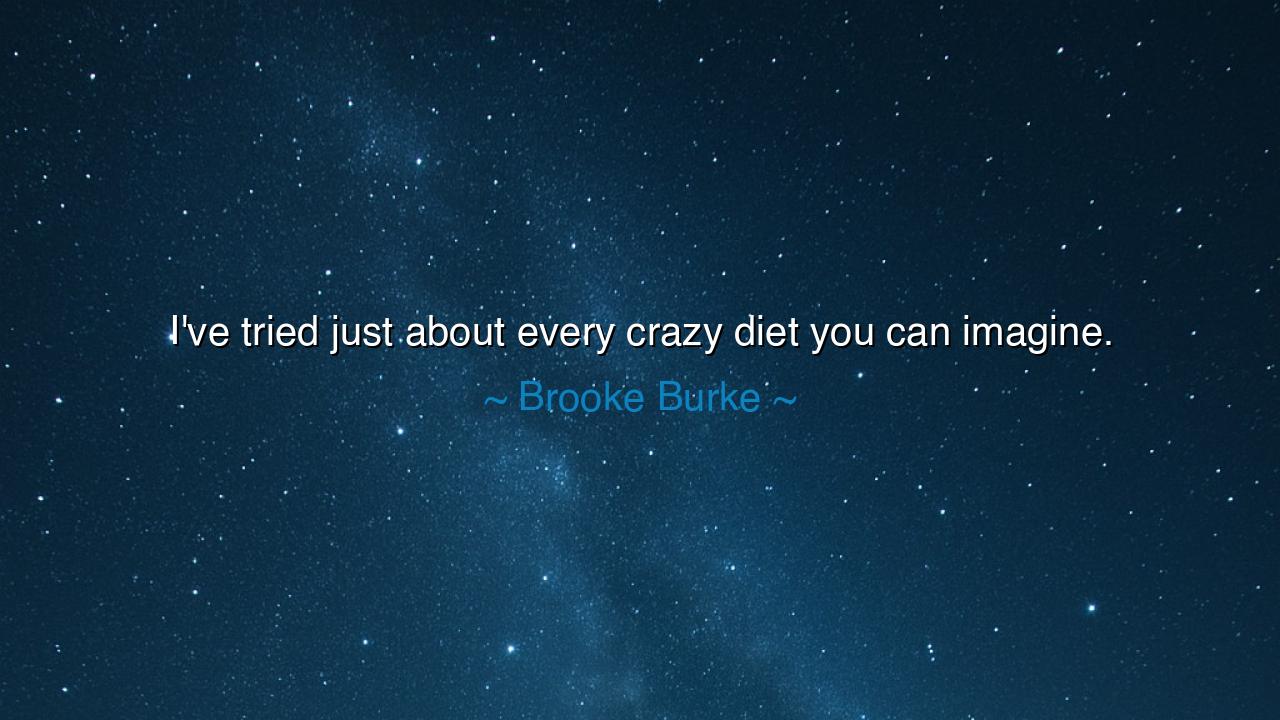
I've tried just about every crazy diet you can imagine.






When Brooke Burke said, “I’ve tried just about every crazy diet you can imagine,” she spoke not only of her own experience, but of the ancient and universal struggle between discipline and desire, between the body’s craving for control and its longing for freedom. Her words are a confession, but also a revelation: that the search for perfection—so often pursued through extremes—leads not to peace, but to exhaustion. Beneath her simple statement lies the echo of humanity’s oldest truth: that the pursuit of balance cannot be found through excess.
The ancients understood this paradox well. The philosopher Aristotle taught that virtue lies in the “golden mean”—the middle path between too much and too little. To eat, to live, to love, to labor—each must be guided not by obsession, but by moderation. When Burke admits she has tried “every crazy diet,” she becomes the modern emblem of what the Greeks called hubris—the overreaching spirit that strives for godlike perfection but forgets the mortal cost. Each diet, each experiment, is a small rebellion against the natural rhythm of the body, and in the end, the body always claims its due.
To understand her words is to see the human heart laid bare. For what she expresses is not vanity, but yearning—the yearning to be better, to master the flesh, to conform to the ever-shifting ideals that society holds before us like golden idols. It is the same hunger that drove the ascetics of ancient times to fast in the desert, believing that through deprivation they could find purity. And yet, even they, in their silence and solitude, learned the same lesson Burke has spoken aloud: that peace cannot be achieved through punishment. The body is not an enemy to be subdued, but a companion to be understood.
Consider the story of Diogenes, the philosopher who lived in a barrel and owned nothing. He mocked those who obsessed over possessions and appearances, believing that freedom came only through detachment. One day, seeing a young man drink water from his hands, Diogenes threw away his cup, exclaiming, “A child has bested me in simplicity.” His lesson was not in scorn, but in recognition—that simplicity, not excess, is the path to wholeness. In the same way, Burke’s journey through “every crazy diet” becomes a pilgrimage through illusion, ending in the rediscovery of truth: that health is not in the method, but in the mindset.
Her statement also speaks to a deeper cultural wound. In an age obsessed with transformation, we are taught to believe that salvation lies in the next miracle cure, the next secret formula, the next restriction disguised as wisdom. The ancient Stoics would have called this slavery to externals. For them, true strength came not from control over food, wealth, or fame, but from control over the self. They would have counseled Burke—as they would counsel us—to turn inward, to seek not the perfect diet, but the perfect understanding of one’s own needs. To eat when hungry, to rest when weary, to live in harmony with nature’s design—that is the eternal diet of the wise.
And yet, there is humility in her admission—a recognition that wisdom is often earned through error. Each failed attempt, each “crazy diet,” is a lesson written in the language of experience. The ancients knew that the path to moderation is rarely straight. Odysseus did not reach home by walking a direct road; he wandered through storms, temptations, and trials, and only through those trials did he learn the value of patience and self-knowledge. So too does Burke’s statement remind us that every misstep in the pursuit of health is not failure, but instruction. The wise learn not from success, but from the exhaustion that follows excess.
Thus, her words carry both lament and liberation. To say “I’ve tried them all” is to admit defeat to false promises—but also to reclaim freedom from them. The lesson she offers is as ancient as it is urgent: seek balance, not extremes; seek understanding, not obsession. The body, like the soul, thrives in rhythm, not in war. Eat not as a prisoner counting rations, nor as a glutton chasing pleasure, but as a being honoring life’s gift. Let nourishment be gratitude, not guilt; let health be harmony, not conquest.
And so, the teaching of Brooke Burke is not about food at all—it is about the art of living. It is a reminder that wisdom is not found in the newest rule or the strictest discipline, but in the quiet courage to listen to oneself. The ancients would have called this sophrosyne—the serenity of one who knows their limits and honors them. Let her words, then, stand as a guide: to eat with awareness, to live with gentleness, and to remember that the truest diet is not of food, but of the spirit—where one feeds on balance, gratitude, and peace.






AAdministratorAdministrator
Welcome, honored guests. Please leave a comment, we will respond soon